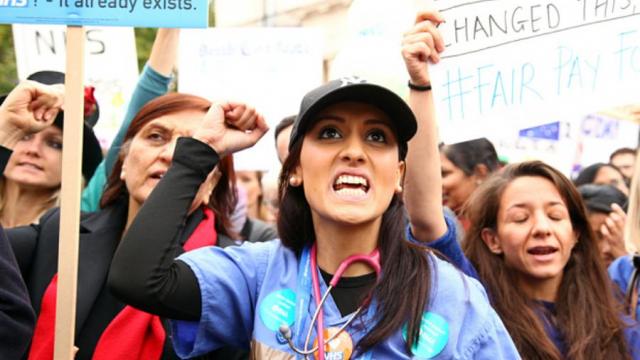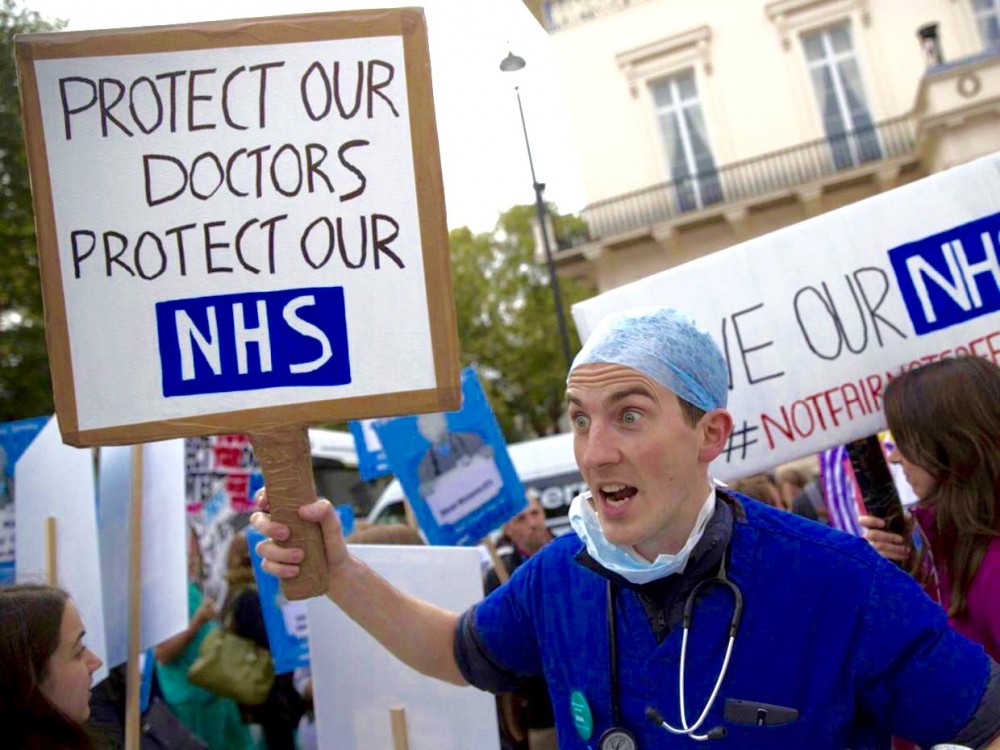
Junior doctors in England will hold a full strike, walking out from all wards including Accident & Emergency, for the first time ever on April 26 and 27. This is an escalation within ongoing actions — like the two-day strike happening today and April 7 — against a new contract imposed on them by the government.
The Conservatives have also enraged teachers, who will strike against plans to turn all English schools into for-profit businesses. Christine Blower, National Union of Teachers’ General Secretary, announced the plan to connect the teachers' struggle with the doctors. The potential of this solidarity has drawn comparisons to 1919’s General Strike, when Union Power reshaped British society.
The U.K. government is already in crisis, due to mounting resistance against its austerity agenda, which Occupy.com reported on last week. Since then, officials have drawn heavy criticism for mishandling another crisis, as Tata Steel announced it will close down most of Britain’s steel plants.
Opposition leader Jeremy Corbyn is spearheading the effort to save the industry and the jobs it provides. But the government’s actions on education and healthcare shows it is unlikely to want to support British industries either. At the heart of this matter: the government is pushing neoliberal privatization and sell-offs faster than ever.
Neoliberalism vs. the NHS
The new contract for doctors follows previous NHS privatization and austerity cuts. Prime Minister David Cameron’s government, in coalition with the Liberal Democrats, introduced the controversial Health and Social Care Act in 2012. It allowedprivate healthcare to take over £13 billion worth of NHS contracts.
In 2014, the coalition provoked the first industrial action by nurses, midwives and other NHS workers in three decades. Their strike was against wage reductions and spending cuts. Due to the ongoing austerity cuts, Britain now has one of the worst healthcare systems in Europe. Under these conditions, it's almost inevitable that further NHS cuts will lead to more unnecessary deaths.
In reaction to the new junior doctor contract, the British Medical Association has launched a judicial review to challenge whether the government is acting legally. The new contract would mean doctors work more hours for less pay. Doctors assert that they are already acutely underfunded and overstretched – a situation that will only worsen since the government hid £650 million in NHS cuts in its recent Budget.
Neoliberalism vs. Education
In the same budget, the government announced that all schools will become academies by 2022. Teacher Unions reject these schools as they remove democratic oversight, often use non-qualified teachers, and underpay qualified teachers. An article entitled "The Schools Business" lays out corporate dangers such as handing the schools system over to big businesses, including hedge-funds and international banks, which both caused and profited from the financial crash of 2007-8.
Britain has been on a privatization course since Margaret Thatcher. But the project has accelerated greatly with the current government, which is particularly clear with its new health and education measures. The rate of austerity is in many ways comparable to the severe cuts enforced on the Global South and Southern Europe.
Neoliberalism vs. Democracy
The U.K. government's legitimacy in pushing through IMF-style cuts and privatization is questionable; after all, it only received25% support of registered votes in the 2015 election. And this support was based on pre-election promises that government would "cut the deficit: not the NHS," and not privatize all schools into academies. U.K. opinion polls also show an overwhelming majority of Brits want to keep the NHS and public services.
But rather than recognizing the degree of popular resistance against their program, the government seems to be using a strategy described by the critical thinker Noam Chomsky: “The standard technique of privatization is defund, make sure things don’t work, people get angry: you hand it over to private capital.”
But in the British government’s case, they often are the private capital.
Where government starts and private healthcare stops is hard to define. Andrew Lansley, the former Health Secretary who introduced the 2012 healthcare privatization, now works as a private healthcare consultant. Unite the Union research showed private healthcare gave Lansley money while he was Health Secretary and paid 64 Conservative MPs and 7 Lib-Dems money, including Cameron and the current health secretary Jeremy Hunt. Read here for many more examples of politicians profiteering from NHS privatization.
The government’s role in academy schools is equally incestuous. Key Conservative donor John Nash was made a Lord and a government minister for schools. Nash has major interests in venture capitalism and works for a chain of academies set up by his wife. The current government also tried unsuccessfully to make David Ross head of the official school inspector Ofsted, even though the Conservative donor founded 25 academies.
Neoliberalism vs. Alternatives
Since the 1990s, New Labour has given weight to the core neoliberal idea that alternatives do not exist: at least not within Westminster party politics. Under Tony Blair and Gordon Brown, the party encouraged NHS privatization, especially through Private Finance Initiatives, and created the first academy schools.
Today, this political landscape has changed drastically.
The Scottish independence referendum, for example, caused the Scottish National Party both to surge in support and to shift left following the grassroots energy. The SNP stood on an anti-austerity platform for the 2015 election and took nearly all of Scotland's electoral seats. In that same election, New Labour failed on an “austerity-light” program.
Afterwards, Labour’s grassroots elected Jeremy Corbyn, convincingly standing for free education, universal healthcare and other anti-neoliberal policies. Since taking the helm, Corbyn has stressed how Labour needs to work alongside grassroots movements, unions and civil society. It was a point emphasized by the warm reception he received at the Teacher’s Union – the first time a Labour leader had ever spoken to this union’s annual congress.
It is uncertain what will happen next as teacher and doctor strikes challenge the government alongside social movements. But it is clear that opposition to Britain's neoliberal moment in history has finally gained momentum – right at the moment when the establishment plans to completely tear the country apart.
3 WAYS TO SHOW YOUR SUPPORT
- Log in to post comments













Comments
Roch replied on
Thank you-- what is the
Thank you-- what is the purpose of (fake)Austerity-- just so the B$€£¥CEOmiddlemen can have more and more and MORE? When <20 people on the USA own more than ONEHALF of the private wealth-- what is the point. Ditto GB where the Queen is one of the wealthiest --posh talk of the world?